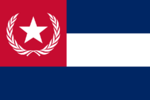First Inglaterran Confederacy: Difference between revisions
(Created page with "{{Infobox former country |native_name = ''Federazione delle Repubbliche Soltenitiche'' |conventional_long_name = Confederacy of Inglaterra |common_name = Inglaterra...") |
No edit summary |
||
| (18 intermediate revisions by the same user not shown) | |||
| Line 1: | Line 1: | ||
{{Infobox former country | {{Infobox former country | ||
|native_name = '' | |native_name = ''{{collapsible list | ||
| titlestyle = background:transparent;text-align:center;line-height:normal;font-size:86%; | |||
| title = Native Names | |||
| {{Infobox | |||
| subbox=yes | |||
| bodystyle=font-size:77%;font-weight:normal; | |||
| rowclass1 = mergedrow | |||
| label1 = [[Inglaterran Language|Inglaterran]] | |||
| data1 = Konfederaasje fan Inglaterra | |||
| rowclass2 = mergedrow | |||
| label2 = {{wp|Swedish language|Frigan}} | |||
| data2 = Konføderasjon av Inglaterra | |||
}} | |||
}}'' | |||
|conventional_long_name = Confederacy of Inglaterra | |conventional_long_name = Confederacy of Inglaterra | ||
|common_name = Inglaterra | |common_name = Inglaterra | ||
|iso3166code = omit | |iso3166code = omit | ||
|status = | |status = | ||
|era = [[First Great War | |era = [[First Great War]] | ||
|event_start = UDI | |event_start = UDI | ||
|date_start = 19 June | |date_start = 19 June | ||
|year_start = 1899 | |year_start = 1899 | ||
|event_end = [[Kompar Coup]] | |event_end = [[Kompar Coup]] | ||
|date_end = | |date_end = 1 July | ||
|year_end = | |year_end = 1936 | ||
|event_post = | |event_post = | ||
|date_post = | |date_post = | ||
| Line 26: | Line 39: | ||
|p6 = | |p6 = | ||
|flag_p6 = | |flag_p6 = | ||
|s1 = | |s1 = Komrep Inglaterra | ||
|flag_s1 = | |flag_s1 = Kompar Flag.png | ||
|image_flag = [[File:First Confederacy of Inglaterra.png|150px]] | |image_flag = [[File:First Confederacy of Inglaterra.png|150px]] | ||
|flag_alt = | |flag_alt = | ||
| Line 34: | Line 47: | ||
|symbol_type = | |symbol_type = | ||
|coat_alt = | |coat_alt = | ||
|image_map = | |image_map = [[File:First Confederate Globe.png|frameless]] | ||
|image_map_alt = | |image_map_alt = | ||
|image_map_caption = | |image_map_caption = <small> | ||
{{Legend|#008000|Territory in 1936}} | |||
{{Legend|#55c255|Territory lost after [[First Great War]]}}</small> | |||
|national_motto = ''God is mei ús''<br/>{{small|"God is with us"}} | |national_motto = ''God is mei ús''<br/>{{small|"God is with us"}} | ||
|national_anthem = | |national_anthem = | ||
|capital = | |capital = [[Aachtigen]] | ||
|common_languages = | |common_languages = [[Inglaterran Language|Inglaterran]] and {{wp|Swedish language|Frigan}}<br><small>''on national scale''</small><br>{{wp|Welsh language|Inith}}, {{wp|Irish language|Diash}}, and {{wp|Afirkaans|Nuwelander}}<br><small>''on regional scale''</small> | ||
|government_type = Aristocratic confederal parliamentary republic | |||
|title_leader = [[Chancellor of Inglaterra|Chancellor]] | |||
|leader1 = [[Joeri Wasindone]] (first) | |||
|government_type = | |||
|title_leader = | |||
|leader1 = Joeri Wasindone (first) | |||
|year_leader1 = 1899-1905 | |year_leader1 = 1899-1905 | ||
|leader2 = Adolphus Hiet (last) | |leader2 = [[Adolphus Hiet]] (last) | ||
|year_leader2 = 1935 | |year_leader2 = 1935 | ||
|leader3 = | |leader3 = | ||
| Line 75: | Line 86: | ||
|stat_pop4 = | |stat_pop4 = | ||
|stat_area4 = | |stat_area4 = | ||
|currency | |currency = Brûnsstik (฿) | ||
|footnotes = | |footnotes = | ||
|today = | |today = | ||
}} | }} | ||
The ''' | The '''First Inglaterran Confederacy''' (Inglaterran: ''Earste Inglatereesk Konfederaasje''), officially named the '''Confederacy of Inglaterra''', was the government of Inglaterra from its independence in 1899 to the [[Kompar Coup]] of 1935. | ||
Following the independence of Inglaterra from [[Greater Niagara]] in 1899, the country was organized under a decentralized confederacy with a democratically elected government. This decentralized nature was designed to grant concessions to lingual minorities and to appease Frigan speakers in a country previously dominated by Inglaterran speakers. | |||
In its initial years, grave problems beset the Confederacy, such as economic woes and dissatisfaction with the new government, including political murders and several secession attempts from nationalists of minority groups; internationally, it suffered a lack in power and reduced diplomatic standing, as the formidable Niagaran Navy no longer protected the country and weakened its standing worldwide. Additionally, countries like [[Alanna]] refused to deal with the Confederacy in fear that their own colonial possession may one day rebel as well. By 1910, the economy had stabilized and with it the political system, and the Confederacy enjoyed relative prosperity for the next three decades; this period, sometimes known as the Golden Years, was characterised by significant cultural flourishing, social progress, and gradual improvement in standards of living. Under the Pensioner Act of 1910, Inglaterra moved toward becoming one of the first states to implement a robust pension system, and trade agreements had returned some diplomatic power to the Confederacy. Nevertheless, especially on the political left, there remained strong and widespread resentment against the former colonial aristocracy which still dominated politics and those who had supported it. | |||
Despite the democratic nature of the Confederacy, the politics of the day were dominated by the urban cities in the far east and far west of the country. This political system, known as [[Potato Bread Politics]], effectively meant that the presidency was handed from the two center parties, the [[Confederal Party of Inglaterra|Confederalists]] and the [[Social Republican Party of Inglaterra|Social Republican Party]], both of which were supported by the aristocracy. Many landowners and employers would encourage their workers to vote for certain candidates in races or lose their jobs and homes, effectively meaning the power of the system lay with the upper classes. After the [[First Great War]] ended, the subsequent social and political unrest led to the rise in the [[Communist Party of Inglaterra]] or KMI, also known as the Kompars. In [[1935 Inglaterran Election|1935]], the Communist candidate, former soldier and journalist [[Karl Hoeven]], narrowly lost to former general [[Adolphus Hiet]], by less than 1% of the total vote. This led to Hoeven marching on Aachtigen with a contingent of troops and seizing the government by force. Hiet would be publicly executed after being captured trying to defend the palace himself. Hoeven would crack down on political oppositon and brought about a swift collapse of democratic government. By 1939, the country would be firmly under his control. | |||
Latest revision as of 17:42, 14 October 2023
Confederacy of Inglaterra Native Names
| |||||||||
|---|---|---|---|---|---|---|---|---|---|
| 1899–1936 | |||||||||
|
Flag of the Inglaterra Confederacy | |||||||||
| Motto: God is mei ús "God is with us" | |||||||||
 Territory in 1936
Territory lost after First Great War | |||||||||
| Capital | Aachtigen | ||||||||
| Common languages | Inglaterran and Frigan on national scale Inith, Diash, and Nuwelander on regional scale | ||||||||
| Religion |
| ||||||||
| Government | Aristocratic confederal parliamentary republic | ||||||||
| Chancellor | |||||||||
• 1899-1905 | Joeri Wasindone (first) | ||||||||
• 1935 | Adolphus Hiet (last) | ||||||||
| Legislature | Confederal Congress | ||||||||
• Upper House | Confederal Council | ||||||||
• Lower House | General Assembly | ||||||||
| Historical era | First Great War | ||||||||
• UDI | 19 June 1899 | ||||||||
| 1 July 1936 | |||||||||
| Population | |||||||||
• 1894 | 106,000,000 | ||||||||
• 1934 | 112,000,000 | ||||||||
| Currency | Brûnsstik (฿) | ||||||||
| |||||||||
The First Inglaterran Confederacy (Inglaterran: Earste Inglatereesk Konfederaasje), officially named the Confederacy of Inglaterra, was the government of Inglaterra from its independence in 1899 to the Kompar Coup of 1935.
Following the independence of Inglaterra from Greater Niagara in 1899, the country was organized under a decentralized confederacy with a democratically elected government. This decentralized nature was designed to grant concessions to lingual minorities and to appease Frigan speakers in a country previously dominated by Inglaterran speakers.
In its initial years, grave problems beset the Confederacy, such as economic woes and dissatisfaction with the new government, including political murders and several secession attempts from nationalists of minority groups; internationally, it suffered a lack in power and reduced diplomatic standing, as the formidable Niagaran Navy no longer protected the country and weakened its standing worldwide. Additionally, countries like Alanna refused to deal with the Confederacy in fear that their own colonial possession may one day rebel as well. By 1910, the economy had stabilized and with it the political system, and the Confederacy enjoyed relative prosperity for the next three decades; this period, sometimes known as the Golden Years, was characterised by significant cultural flourishing, social progress, and gradual improvement in standards of living. Under the Pensioner Act of 1910, Inglaterra moved toward becoming one of the first states to implement a robust pension system, and trade agreements had returned some diplomatic power to the Confederacy. Nevertheless, especially on the political left, there remained strong and widespread resentment against the former colonial aristocracy which still dominated politics and those who had supported it.
Despite the democratic nature of the Confederacy, the politics of the day were dominated by the urban cities in the far east and far west of the country. This political system, known as Potato Bread Politics, effectively meant that the presidency was handed from the two center parties, the Confederalists and the Social Republican Party, both of which were supported by the aristocracy. Many landowners and employers would encourage their workers to vote for certain candidates in races or lose their jobs and homes, effectively meaning the power of the system lay with the upper classes. After the First Great War ended, the subsequent social and political unrest led to the rise in the Communist Party of Inglaterra or KMI, also known as the Kompars. In 1935, the Communist candidate, former soldier and journalist Karl Hoeven, narrowly lost to former general Adolphus Hiet, by less than 1% of the total vote. This led to Hoeven marching on Aachtigen with a contingent of troops and seizing the government by force. Hiet would be publicly executed after being captured trying to defend the palace himself. Hoeven would crack down on political oppositon and brought about a swift collapse of democratic government. By 1939, the country would be firmly under his control.
